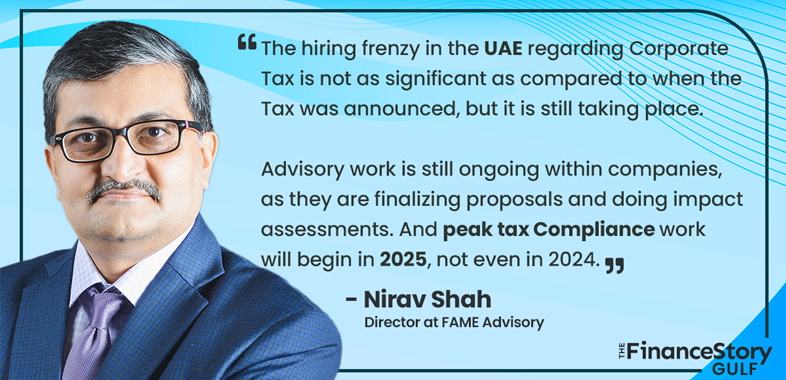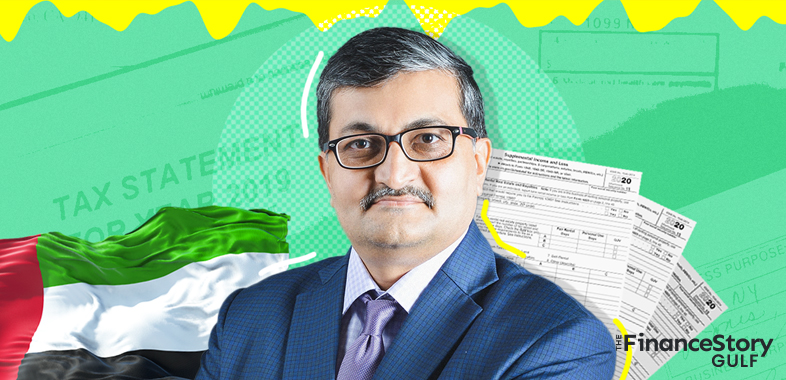In January 2022, the UAE Ministry of Finance introduced federal Corporate Tax (CT) on the net profits of businesses across all the emirates.
The tax became applicable on 1st June 2023. With a standard rate of 9%, it is the lowest Corporate Income Tax rate within the GCC region (Except for Bahrain).
If you are a Tax Professional, naturally, you may be curious to understand ‘What kind of hiring is happening in the UAE after Corporate Tax has become effective from 1st June 2023?’
To give you a perspective, The Finance Story caught up with Nirav Shah, Founder of Fame Advisory, a boutique firm specializing in Tax Compliance, Advisory Services, and Company Setup.
Having witnessed the UAE’s tax landscape evolve over the past decade, he will provide insights into the ongoing transformations.
How did Dubai happen? Why did you start your firm?
In 1994, I qualified as a Chartered Accountant and joined my father’s practice in Gujarat, India.
After learning extensively, I expanded my horizons by joining KPMG’s tax team in Mumbai in 1998, specializing in international tax.
Later, I took on the role of Vice President for Tax and Finance in a Diamond firm, leading to a move to Dubai. I continued to manage the company’s finance, tax, and legal aspects across ten countries.
In 2015, seeking a fresh challenge, I founded Fame Advisory, exclusively focusing on international tax consulting.
Despite skepticism due to Dubai’s tax-free status, I capitalized on the value of expertise, aiding companies in setting up tax-efficient structures and offering comprehensive advisory services.
Fame Advisory has since evolved to encompass VAT, Corporate compliance, advisory, and company setup. We now serve 150 corporate clients and 20-30 families.
When VAT was implemented in the UAE, we saw significant hiring. What was the hiring pattern like after Corporate Tax was announced?
To understand the new Corporate Tax hiring pattern, we have to look at the UAE’s tax history first.
Before Corporate Tax, the UAE implemented two kinds of taxes: Excise Tax in 2017 and VAT in 2018.
There was no significant hiring concerning Excise Tax, as it only applied to a few goods. However, when VAT was announced, demand for Tax professionals surged, and we witnessed a lot of hiring.
Almost 60 to 70 Tax and Audit firms from India and many other parts of the world came rushing in and set up offices in the UAE.
They predicted great opportunities, but compliance requirements for VAT in the UAE are less stringent (as compared to the GST system in India).
A mere commerce graduate could adeptly handle and organize data for VAT returns with little difficulty.
Businesses realized this and soon opted for an in-house tax team to handle the same. (Unfortunately, many consulting firms closed down due to these unexpected challenges.)
Unlike VAT, Corporate Tax is a lot more complex.
When Corporate Tax (CT) was announced, the UAE faced a shortage of specialized tax professionals. And those trained in handling VAT returns needed a comprehensive understanding of CT.
Professional services firms (small, big, specialized tax firms) needed individuals who possessed taxation experience to at least put everything in order and effectively manage assignments from clients.
Mostly, senior Corporate Tax Professionals with strong advisory backgrounds were hired. These old folks then built the team.
Then came the MNCs. They thought, ‘Our Finance team can handle VAT-related work, but now, with CT coming in and different accounting policies to follow, we need a professional to take care of both of these aspects.’
That’s how this entire hiring landscape unfolded.
The majority of hires took place within professional consulting and audit firms.

Could you tell us about the hiring Landscape for Tax Professionals in the UAE spanning 2023 and 2024?
Post 1st June 2023, the hiring frenzy is less significant than when Corporate Tax was initially announced, but it still occurs.
Here is a breakdown:
Advisory Roles
In the UAE, organizations can follow their financial year. For example, if a company is on an April to March cycle, its first tax period starts on April 1, 2024, giving it a nine-month window.
That is why Advisory work is ongoing within companies, as they are finalizing proposals and doing impact assessments.
They are building big teams to handle Corporate Tax, but be aware that the Advisory work will last another 1 or 2 years.
Who’s hiring?
Corporates: MNCs are mainly seeking Big Four tax advisory services.
However, due to its cost-effectiveness, many have started building an in-house Tax team to handle the entire tax function and oversee the region.
They are typically hiring senior tax experts with 8-12 years of industry experience who have handled multiple GCC region tax jurisdictions. Companies want them
Finance professionals with Tax expertise as well are also in demand. They will typically handle Finance cum Tax functions.
Big 4s: Of course, Big 4s are hiring at all levels. They seek experienced individuals, ranging from juniors with two to three years of experience to those with five to eight years of experience.
Compliance Roles
E-invoicing will be mandatory for UAE Corporate Tax (CT) starting 1 July 2025, per the Federal Tax Authority (FTA).
It’s a reality that compliance demands will increase about Corporate Tax, but not as soon as you would think.
Since many companies are still in the planning stage, peak tax compliance work will begin in 2025, not even in 2024.
Who’s hiring?
If you are a tax compliance professional, consider a role within:
- Consulting firms to be a part of the tax execution team
- or larger multinational groups where they are building a tax team.
If you are a finance and tax professional, I recommend looking into roles that combine finance and tax responsibilities, such as a finance and tax role.
In addition:
- Work related to Economic Substance Regulations and Corporate Law compliance, which was nonexistent a year or two ago, has now come up.
- As a result, Secretarial Professionals are in high demand for arranging board meetings and taking proper minutes. Mid to senior-level finance professionals can also seize this opportunity.
- Corporations are actively hiring in-house personnel to manage transfer pricing on a long-term basis.
- Additionally, they want professionals to reinforce finance teams, encompassing tax oversight within the financial function.
What would you tell Tax Professionals seeking opportunities in the UAE?
I have noticed people lining up, eager to relocate to the UAE for better jobs. Please hold on.
Assess your opportunities very carefully. Ask yourself, ‘Does it make sense from a long-term point of view?’
To give you a heads up, the Big 4 appointed large teams when VAT was introduced. What happened? They had to let go of almost half of the group except the core members. Most of the work has been outsourced.
Today, The Big 4s are assembling big teams focused on Corporate Tax. However, the workload is going to decrease. If they can’t reappoint those hires to Advisory or another set of roles, the Big 4 will cut them off.
And that’s my genuine concern.
After spending 2-3 years in UAE, you’ll find getting a placement at the same level more challenging when you return to India.
One needs to keep all of this in mind. However, it is an excellent time to take up a role in the UAE if you assess all the factors and then move.
Many Tax Professionals already working in Corporate Tax want to make the most of this spike in demand. What advice would you give them?
It may seem tempting to jump to a high-paying Corporate Tax role.
Some employers may pay you excessively initially, but if you don’t position yourself as a cutting-edge professional in your field, they’ll cut you off.
Rather than fixating on the monetary aspect, consider your choices from a three-year horizon perspective.
Then, could you figure out if the effort is worth pursuing?
Factors one needs to consider before shortlisting a company?
In the UAE, many new companies emerge every year, creating a diverse pool of opportunities.
When deciding on a company, it’s essential to do a thorough evaluation by considering several key factors:
Company Longevity and Size:
- Consider the company’s size, scale of operations, and UAE presence, as this often reflects its stability and potential for growth.
Background Research:
- Delve into the profiles of the company’s existing team members.
- Evaluate their track record and professional ethos to gain insights into the working culture.
Financial Viability:
- Analyze the company’s current revenue streams.
- Figure out whether they can sustain investments in a new team, even if client work is limited initially.
Role Specifics:
- Inquire about the specifics of your role within the organization.
- In some cases, joining as a dedicated tax person manager might not be suitable for smaller teams.
Please ask questions during your interview so you can gain more clarity.
Could you give us a closing message?
There’s an opportunity in the UAE. But it’s crucial to note that the number of applicants is significantly higher.
Tax Experts from different European countries and nationalities are also eyeing the UAE.
Within this competitive arena, the key lies in setting yourself apart.
When you enter the UAE, your horizon expands, and your outlook shifts. It’s important to realize that your domestic work experience, while relevant, will undergo a complete transformation.
If you’re ready for that challenge, you’ll need new skill sets and a leap.
Are you looking at moving to the UAE? Could you tell us why and what role in the comments?







